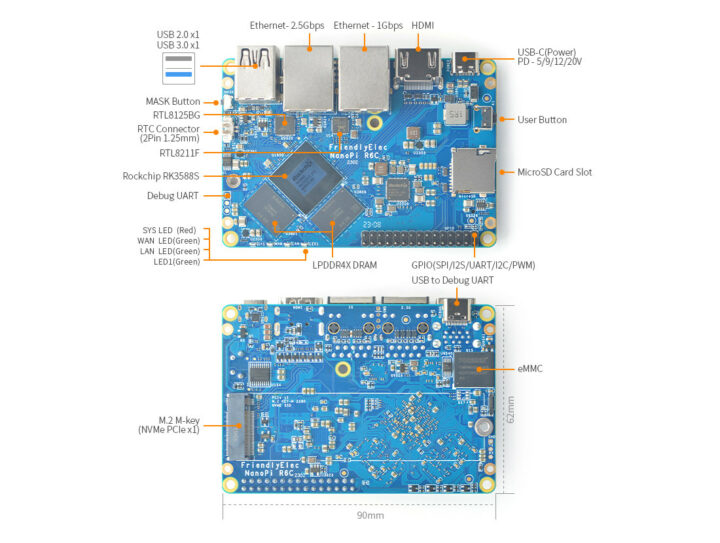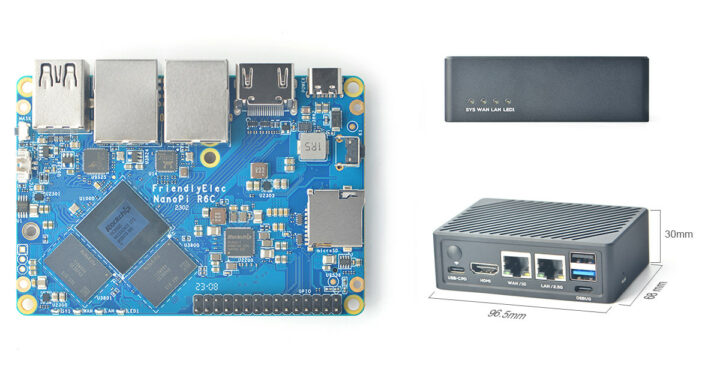FriendlyElec has come up with a low-cost version of the NanoPi R6S with the NanoPi R6C router/SBC based on the same Rockchip RK3588S octa-core Cortex-A76/A55 processor but offering just one Gigabit Ethernet port and one 2.5GbE port, and adding an M.2 NVMe SSD socket for storage.
The NanoPi R6C is also offered with 4GB or 8GB RAM, an optional 32GB eMMC flash soldered on the board, a Micro SD card socket, an 8K capable HDMI 2.1, USB 3.0 and USB 2.0 ports, and a few extra features we’ll discuss further below.
- SoC – Rockchip RK3588S octa-core processor with:
- CPU – 4x Cortex-A76 cores @ up to 2.4 GHz, four Cortex-A55 cores @ 1.8 GHz
- GPU – Arm Mali-G610 MP4 quad-core GPU with OpenGL ES3.2 / OpenCL 2.2 / Vulkan1.1 support
- VPU – 8Kp60 H.265/VP9/AVS2 video decoder, 8Kp30 H.264 decoder, 4Kp60 AV1 decoder, 8Kp30 H.265/H.264 video encoder
- AI accelerator – 6 TOPS NPU
- System Memory – 4GB or 8GB LPDDR4X @ 2133 MHz
- Storage
- MicroSD card socket up to SDR104 mode
- M.2 PCIe 2.1 x1 socket for NVMe 2280 SSD
- Optional 32 GB eMMC flash (HS400 mode)
- Video Output – 1x HDMI 2.1 port up to 8Kp60, or 4Kp120
- Networking
- 1x 2.5GbE RJ45 port via Realtek RTL8125BG PCIe controller tested up to 2.35 Gbps (Rx) and 2.35 Gbps (Tx)
- 1x Gigabit Ethernet RJ45 port via Realtek RTL8211F tested up to 941 Mbps (Tx and Rx)
- USB – 1x USB 3.0 port, 1x USB 2.0 port
- Expansion – 30-pin 2.54mm header connector up to 1x SPI, 3x UARTs, 3x I2Cs, 2x SPDIFs, 1x I2Ss, 3x PWMs, 1x CAN, 20x GPIOs
- Debugging – 3-pin UART header and USB-C Debug UART port with CH341 chip
- Misc
- Mask key for eMMC flash update
- 2-Pin 1.27/1.25mm RTC battery input connector for low-power RTC IC HYM8563TS
- 1x user button
- 4x user-programmable LEDs (SYS, WAN, LAN, LED1)
- Power Supply – 5V/9V/12V/20V USB Type-C port (USB PD support)
- Dimensions – PCB: 90 x 62 mm; enclosure: 96.5 x 68 x 30 mm
- Weight – TBD
- Temperature Range – 0 to 70
 I wish FriendlyElec could have made a dual 2.5GbE router with an M.2 NVMe socket, but that’s not possible with the Rockchip RK3588S processor, and the second 2.5GbE port found in R6S is the casualty of having support for an M.2 PCIe SSD. Other changes include more I/Os with a 30-pin header replacing the 12-pin GPIO header on the NanoPi R6S, and some will be happy to find a USB-C to UART port for easy access to the serial console without having to open or hardware-hack the router to add an external serial interface.
I wish FriendlyElec could have made a dual 2.5GbE router with an M.2 NVMe socket, but that’s not possible with the Rockchip RK3588S processor, and the second 2.5GbE port found in R6S is the casualty of having support for an M.2 PCIe SSD. Other changes include more I/Os with a 30-pin header replacing the 12-pin GPIO header on the NanoPi R6S, and some will be happy to find a USB-C to UART port for easy access to the serial console without having to open or hardware-hack the router to add an external serial interface.
Software support will be the same as for the NanoPi R6S router with OpenWrt-based FriendlyWrt, Android, Debian, and Ubuntu images provided along with detailed documentation in the Wiki. My experience with the NanoPi R6S router was overall positive both with FriendlyWrt 22.03 and Ubuntu 22.04, after some difficulties unrelated to FriendlyElec installing the latter, but I noted some improvements may be needed for video playback in Linux. The power consumption of the R6S was fairly high at idle, and that’s something I’ll check when reviewing the NanoPi R6C router as well.
One way FriendlyElec lowers the cost of the NanoPi R6C is to offer it as a barebone SBC with 4GB RAM and no storage for $85 plus shipping. If you want a complete system with 8GB RAM, 32GB flash, and a metal enclosure, the price goes up to $125, or $14 less than the equivalent NanoPi R6S router.

Jean-Luc started CNX Software in 2010 as a part-time endeavor, before quitting his job as a software engineering manager, and starting to write daily news, and reviews full time later in 2011.
Support CNX Software! Donate via cryptocurrencies, become a Patron on Patreon, or purchase goods on Amazon or Aliexpress





